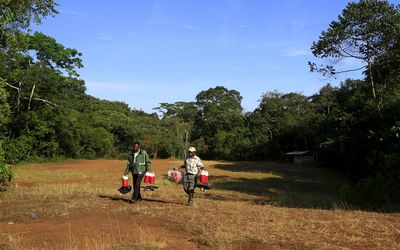Source:

New study shows Zika may affect adult brains too
by Betsy McKay
2016-08-19 13:14:00.0
ZIKA is known to cause brain damage in the foetuses of infected pregnant women. Now a new study suggests the virus may also be able to harm the brains of some adults.
Scientists at the Rockefeller University and the La Jolla Institute for Allergy and Immunology infected adult mice with Zika and watched the virus zero in on and damage brain cells that are important to memory and learning, in much the same way researchers have documented how it attacks and kills cells critical to foetal brain development.
The research was published on Thursday in the journal Cell Stem Cell. The authors of the study cautioned that it was difficult to know the extent to which the findings, in mice whose immune systems were weakened, applied to humans, and said they planned further research. But the findings clearly suggested that Zika may not be as benign an infection for adults — or even children — as currently thought, particularly for those with weakened immune systems, they said.
Damage to these cells could potentially lead long term to depression or other cognitive problems, they said.
"Zika has the potential to cause damage in the adult brain," said Joseph Gleeson, adjunct professor and head of the laboratory of paediatric brain disease at New York’s Rockefeller University, and an author on the study.
The study delivers just the latest unsettling news about a virus that until very recently was not thought to be terribly harmful.
Over the past year, doctors and researchers have discovered the mosquito-borne virus can severely damage foetal brains. It can be spread sexually by men and women. There have also been other signs that the virus can harm adults: It has been linked to a rare neurological disorder, Guillain-Barre Syndrome. Scientists are exploring possible links with encephalitis, too.
"This is one more ‘oh my goodness’," said Sujan Shresta, a professor at the La Jolla Institute of Allergy and Immunology in California, and a study author who created the mouse model used in the research.
Gleeson, who runs a neurobiology lab, approached Shresta, an immunologist, at his son’s high school in April, after hearing her give a talk. Scientists had already shown how Zika targeted so-called neural progenitor cells, which are responsible for generating neurons that form the foetal brain. The virus killed those cells or caused them to stop functioning normally, impeding the development of new brain tissue.
Gleeson and Shresta wanted to see if Zika would have the same effect on equivalent cells in adult brains. While developing foetal brains are replete with such cells, pockets remain in adults, particularly to generating neurons involved in processing new memories or information.
They infected mice and then did brain scans to find fluorescent biomarkers showing the virus. The populations of those cells "lit up like a Christmas tree", said Gleeson. "We found Zika had a profound effect," killing cells and reducing the production of new neurons."
The findings would probably apply to children as well as adults because they have more of these cells, Shresta said. "Their brains are still developing," she said.
"I think this is a very, very important finding and the reason for that is so far the focus with Zika has been linked to microcephaly and pregnancy," said Hongjun Song, a professor of neurology at Johns Hopkins University School of Medicine in Baltimore. He was among the team of scientists that published a paper in March on the virus’s effect on neural progenitor cells and is continuing to research the effect of Zika on the brain.
"Clearly Zika virus is a beast and can do much more damage," he said.
Gleeson and Shresta said they would like next to test whether Zika attacked the same cells in humans and explore the potential consequences of infection.
"Our next step is to answer those questions — do the cells recover? To what degree and to what extent are there deficits in cognition?" Gleeson said.
More Africa news from The Wall Street Journal
More news from The Wall Street Journal
Premium access to WSJ.com: $1 a week for 12 weeks

Researchers from the Uganda Virus Research Institute carry insect traps at the Zika Forest in Entebbe, south of Uganda's capital Kampala. Picture: REUTERS
ZIKA is known to cause brain damage in the foetuses of infected pregnant women. Now a new study suggests the virus may also be able to harm the brains of some adults.
Scientists at the Rockefeller University and the La Jolla Institute for Allergy and Immunology infected adult mice with Zika and watched the virus zero in on and damage brain cells that are important to memory and learning, in much the same way researchers have documented how it attacks and kills cells critical to foetal brain development.
The research was published on Thursday in the journal Cell Stem Cell. The authors of the study cautioned that it was difficult to know the extent to which the findings, in mice whose immune systems were weakened, applied to humans, and said they planned further research. But the findings clearly suggested that Zika may not be as benign an infection for adults — or even children — as currently thought, particularly for those with weakened immune systems, they said.
Damage to these cells could potentially lead long term to depression or other cognitive problems, they said.
"Zika has the potential to cause damage in the adult brain," said Joseph Gleeson, adjunct professor and head of the laboratory of paediatric brain disease at New York’s Rockefeller University, and an author on the study.
The study delivers just the latest unsettling news about a virus that until very recently was not thought to be terribly harmful.
Over the past year, doctors and researchers have discovered the mosquito-borne virus can severely damage foetal brains. It can be spread sexually by men and women. There have also been other signs that the virus can harm adults: It has been linked to a rare neurological disorder, Guillain-Barre Syndrome. Scientists are exploring possible links with encephalitis, too.
"This is one more ‘oh my goodness’," said Sujan Shresta, a professor at the La Jolla Institute of Allergy and Immunology in California, and a study author who created the mouse model used in the research.
Gleeson, who runs a neurobiology lab, approached Shresta, an immunologist, at his son’s high school in April, after hearing her give a talk. Scientists had already shown how Zika targeted so-called neural progenitor cells, which are responsible for generating neurons that form the foetal brain. The virus killed those cells or caused them to stop functioning normally, impeding the development of new brain tissue.
Gleeson and Shresta wanted to see if Zika would have the same effect on equivalent cells in adult brains. While developing foetal brains are replete with such cells, pockets remain in adults, particularly to generating neurons involved in processing new memories or information.
They infected mice and then did brain scans to find fluorescent biomarkers showing the virus. The populations of those cells "lit up like a Christmas tree", said Gleeson. "We found Zika had a profound effect," killing cells and reducing the production of new neurons."
The findings would probably apply to children as well as adults because they have more of these cells, Shresta said. "Their brains are still developing," she said.
"I think this is a very, very important finding and the reason for that is so far the focus with Zika has been linked to microcephaly and pregnancy," said Hongjun Song, a professor of neurology at Johns Hopkins University School of Medicine in Baltimore. He was among the team of scientists that published a paper in March on the virus’s effect on neural progenitor cells and is continuing to research the effect of Zika on the brain.
"Clearly Zika virus is a beast and can do much more damage," he said.
Gleeson and Shresta said they would like next to test whether Zika attacked the same cells in humans and explore the potential consequences of infection.
"Our next step is to answer those questions — do the cells recover? To what degree and to what extent are there deficits in cognition?" Gleeson said.
More Africa news from The Wall Street Journal
More news from The Wall Street Journal
Premium access to WSJ.com: $1 a week for 12 weeks



















